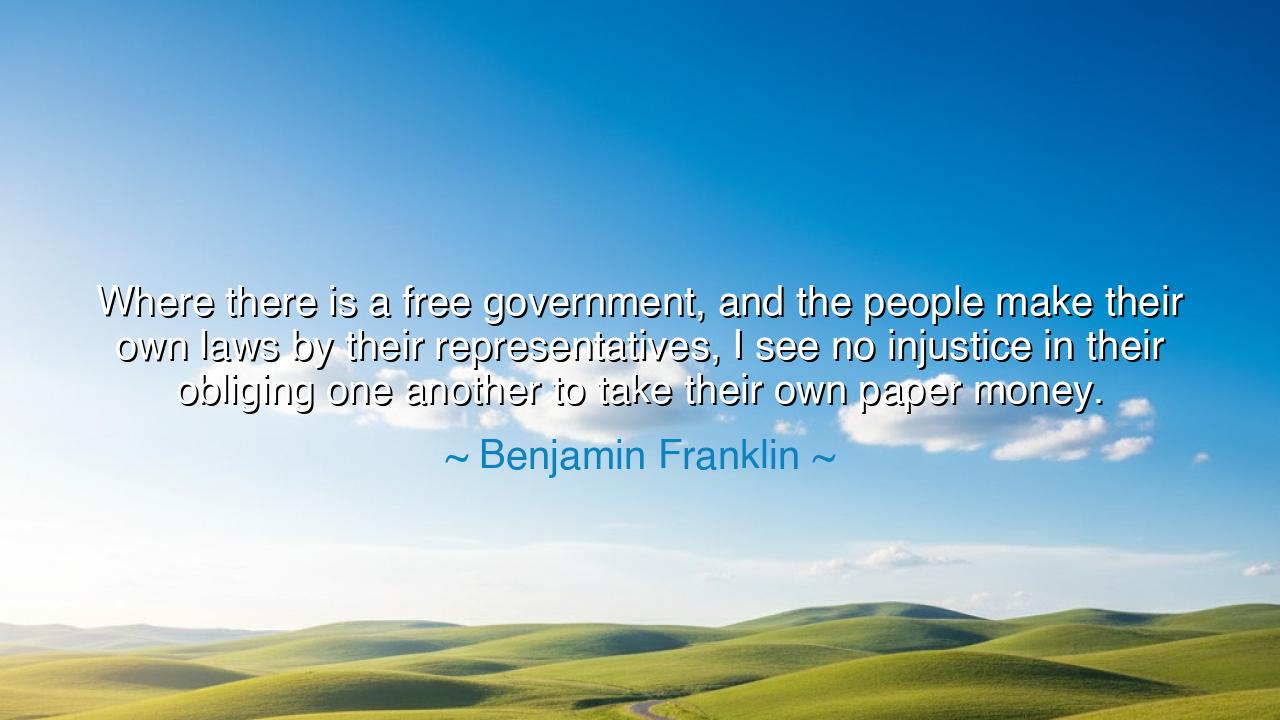
Where there is a free government, and the people make their own
Where there is a free government, and the people make their own laws by their representatives, I see no injustice in their obliging one another to take their own paper money.






The words of Benjamin Franklin, sage of the American founding, shine with the practical wisdom of a man who saw both the fragility and the power of freedom: “Where there is a free government, and the people make their own laws by their representatives, I see no injustice in their obliging one another to take their own paper money.” In this statement, Franklin speaks not merely of economics, but of trust, sovereignty, and the sacred bond between the governed and their laws. For he understood that a free people, united in purpose and guided by consent, may bind themselves to shared duties—because they themselves are both the lawgivers and the obeyers.
The origin of this quote lies in the turbulent financial struggles of the eighteenth century, when the American colonies—poor in gold and silver—turned to paper currency as a means of trade and stability. Many critics, especially in Britain, condemned this practice as fraudulent or unstable. But Franklin, ever the scientist of both nature and society, defended it as an ingenious solution for a free people. In his eyes, paper money was not deceit but self-reliance—a manifestation of the people’s collective faith in themselves. As long as the government issuing it was free, representative, and accountable, there could be no injustice in requiring citizens to accept the value of their own creation. The key was that the authority of the currency rested on the consent of the governed, not the decree of kings.
In the style of the ancients, let us see the deeper meaning in this. Franklin speaks of money, but he teaches a lesson about liberty. In a monarchy, the law is command; in a republic, it is covenant. When a free people make laws, they are not subjects but partners in their own governance. Thus, what they impose upon themselves—be it taxes, regulations, or paper currency—is not tyranny but mutual obligation. This is the heartbeat of a republic: that the people, by their own will, bind themselves for the common good. For Franklin, even the value of money was an act of collective faith—a symbol that the people trusted one another enough to believe in what they had made.
Consider, for a moment, the world that surrounded Franklin. In those early days, the colonies were like fragile ships upon an uncertain sea, struggling for resources, credit, and unity. Gold was scarce, and trade faltered. The merchants of Britain scorned the colonists’ paper notes, calling them worthless. Yet Franklin, with his sharp mind and boundless optimism, saw in paper money not weakness, but ingenuity—a way for ordinary citizens to empower their economy through cooperation. When the colonies printed their own currency, they declared not just economic independence, but moral independence: “We will make our own value, and we will honor it together.”
And indeed, Franklin’s defense of such freedom foreshadowed the greater revolution yet to come. For if a people could be trusted to issue their own money, could they not also be trusted to rule themselves? His words anticipate the spirit of the Declaration of Independence itself—the belief that self-government is not only possible, but just. To Franklin, the ability of a nation to sustain its own laws and economy without the oversight of a monarch was proof of maturity, a sign that men could be both free and disciplined. He saw clearly that the foundation of a republic is not gold or armies, but confidence in one’s own virtue and reason.
Yet his words also carry a warning. A free people must remain vigilant, for the same trust that makes liberty possible can also be betrayed. Paper money, like freedom itself, depends on honor. If a government becomes corrupt, if representatives serve their own greed rather than the public good, then the shared faith that sustains both currency and law collapses. Thus, Franklin’s wisdom teaches that liberty cannot survive without integrity—that freedom and responsibility are two sides of the same coin.
So, my children of the future, take this teaching as both inspiration and charge: self-government requires self-discipline. The laws you obey must be those you have chosen, and the promises you make to one another must be kept, even when it is difficult. A republic is not a gift handed down—it is a trust continually renewed by those who believe in it. When you honor the laws you have made, when you value the work of your own hands, and when you keep faith with your fellow citizens, you are not merely following rules—you are sustaining the soul of freedom itself.
For as Benjamin Franklin knew, the power of a nation does not rest in gold or kings, but in the trust of its people. When citizens believe in the worth of their own word and in the justice of their own laws, no empire can break them. But when that faith dies, no treasure can save them. Therefore, be rich not in gold, but in virtue; be powerful not in authority, but in trust; and be free not because others allow it, but because you have chosen, together, to live as a people worthy of liberty.






AAdministratorAdministrator
Welcome, honored guests. Please leave a comment, we will respond soon